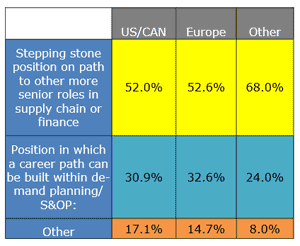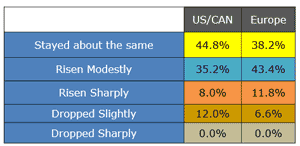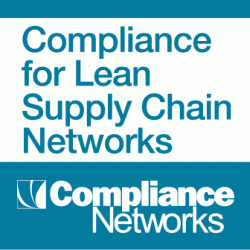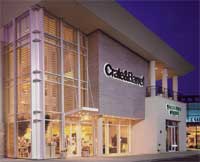 |
November 15, 2013 - Supply Chain Flagship Newsletter |
 |
| THIS WEEK'S SPONSOR: COMPLIANCE NETWORKS |
 |
Vendor Performance Videocasts Spring 2013, WebEDI, Retail Supply Chain Special Reports and more |
 |
|
|||||||||||||||||||||||||||||||||||||||||||||||||||||||||||||||||||||||||||
Understanding the Role of the Demand Planner
|
||||||||||||||||||||||||||||||||||||||||||||||||||||||||||||||||||||||||||||
| GILMORE SAYS: |
"Clearly in the consumer goods and retail sectors, as we move to forecasting each SKU at a store level, the number of DFUs per planner will explode." WHAT DO YOU SAY? |
Relatedly, the type of person hired for demand planning and how that role fits into a career path is quite varied. I was at meeting two year ago where this very topic was discussed by a group of consumer goods and retail companies, and the practices in this regard were all over the map.
For example, some companies relied heavily on new hires out of college to fill junior demand planning roles, a position for which if a demand planner was any good was just a stop on a journey to something better in the supply chain.
Others mostly hired experienced demand planners from other companies, and someone could build a nice career within the demand planning team itself. And every combination in between.
Another topic is how demand planners interact with the rest of the organization. At the recent CSCMP conference, Tony Nikolai of Whirlpool gave an excellent presentation on "getting the politics out of Sales and Operations Planning," which included a process and a culture that was committed to not letting internal pressures affect the initial forecasts from the core demand planners.
Whirlpool insists on unvarnished numbers to start the process. More senior managers would then work these numbers with the business to develop a consensus (actually in Whirlpool's case, more of a range from low to high), but it had to start with the untainted facts.
So with that, I am pleased to share some of the results from our recent benchmark survey on practices and trends on the role of demand planner. I am not sure if there has ever been a study quite like this one. You can download the full report here: Demand Planner Benchmark Study 2013.
I want to thank supply chain planning software provider ToolsGroup for sponsoring this work. ToolsGroup did that really just to help move the industry's understanding of this under-studied topic forward, and I appreciate that.
We had more than 300 respondents from around the globe, led primarily by responses from US companies but a strong showing from Europe, Australia and other developed markets as weak, and then a smaller response from developing economies. So for most of the data, we broke it into North America (meaning the U S and Canada) and Europe (meaning most of Europe plus a few other countries), and in a few cases "Others" as well.
So how about the question of whether a career can be built as a demand planner or not? As can be seen below, for just over half of North American and US companies, demand planning is usually just a stepping stone to other roles in supply chain or finance.

Is the workload in terms of SKUs or DFUs (demand forecasting units - say a product at a location, such as a distribution center) rising for demand planners? The general consensus in the industry is that it is, and our data mostly supports that, as can be seen below, About 35% and 43% of US/Canadian and Euro companies, respectively, say the number of DFUs that demand planners are managing has risen modestly over the past few years, and another 8% and 12% say that number has risen sharply.
Number of DFUs Per Demand Planner Rising Modestly

One question is whether this is in part the result of more automation from demand planning tools (allowing the system to do more of the work rather than the demand planner) or whether the reduction in relative demand planner headcount has forced greater use of automation to keep up. I believe it is a little of both. But clearly in the consumer goods and retail sectors, as we move to forecasting each SKU at a store level, the number of DFUs per planner will explode, requiring much more use of automation and then mostly handling by exception.
Finally, how do companies see their demand planning capabilities overall? The results show something pretty close to a bell curve, with right around 44% in NA and Europe saying their capabilities are average, with around 34% and 38%, respectively, believing they were above average or excellent, though not many claimed excellent status in either region.
How Effective are Demand Planning Processes and Results?

Ok, that's it. More in the full benchmark report.
On another quick note, we've now had more than 100 requests for our 50 Years of Supply Chain Progress timeline video, and managed to send most of those out. Still happy to send you one if you are interested. Send us a note at the Feedback button below.
Do you agree that demand planners are often under appreciated? Any reaction to these data points in the study? Let us know your thoughts at the Feedback section below.
| View Web/Printable Version of this Page |
|
|
|
YOUR FEEDBACK
We received a number of nice letters on last week's Supply Chain History Project column, some just saying "great idea," others offering some history tidbits. A selection of those emails is provided below. Probably a few more next week.
That includes our Feedback of the Week from Mike Regan of TranZact Technologies, who adds some additional history relative to the first transportation Load Control Center at 3M.
Feedback of the Week, on the Supply Chain History Project
Very interesting column and idea. You should have contacted me. I knew Roy Mayeske and another gentleman that worked for him at 3M, Larry Hall. With respect to the software, guess who owns that software today? Yours truly. It was ultimately sold to CSC and we bought it from them in 1999. We named the product StarPlan. If I am not mistaken (and I may be),the person at Schneider who got the product going was a rising hotshot named Chris Lofgren - who is the CEO of Schneider today. When Schneider bought us in 2000 Chris was in charge of the deal and I talked to him about this. Once again, I may be wrong, but the product was initially conceived by optimal decisions out of Cinci, Ohio and was debuted at a NITL Transcomp show.
Great thing you are doing. Mike Regan |
||
Dan, suggest you connect with Cliff Lynch. He was VP Logistics at Quaker Oats in the 1970's, when I believe he sponsored the first (or at least the best at that time) Network Design project. We used an innovative nonlinear optimizer developed at MIT for that (I was at TBS at that time...Cliff remains a good friend...and he is among the best logistics leaders ever).
I can't remember what I did yesterday let alone in the 1970s.
Seriously, as Gene pointed out Quaker engaged Temple Barker & Sloane to do this network analysis in 1973. At that time I don't recall anyone else having done it, but I wouldn't stake my life on it.
It was an excellent piece of work however and gave us a network that held up against at least three more analyses while I was there.
Clifford F. Lynch Sounds like it was very early, but pretty sure the DelMonte project in 1972 was the first, as we showed in the timeline video. Dan Gilmore |
||
You seem to be focusing on modern day supply chain management. If you are going to do a history of supply chain you should at least cover the Roman Civilization’s contributions. The "all roads lead to Rome" concept allowed goods and information (via couriers) to flow in and out of Rome's hub-based logistics control center. An excellent book "Movable Feasts" is a good source of info on the ancient food supply chains. Lawrence (Larry) Lapide, Ph.D. Research Affiliate MIT Center for Transportation & Logistics Editor's Note: Thanks Larry.
To be clear, the video was tied to the 50 years of CSCMP, so it would go no earlier than 1963. The older stuff is either known or lost. I am not saying I will ignore the older stuff (we had the Ford assembly line and "Taylorism" as two of our 10 greatest supply chain innovations of all time) but I am most concerned about stuff that if it isn't captured now, will be lost (can you believe no one as a copy of Mesher's 3Vs research notes?) and putting it all in one place. I will certainly go back a ways...to the Romans? Not sure. Dan Gilmore |
||
Just had the opportunity to view the video depicting milestone supply chain events during the past 50 years. What a great job. Sure, my list might be a bit different but anyone who has been around for a while could say the same. I would like to have a copy to show some peers and those on my team.
Director of Global Logistics iRobot Corporation
|
SUPPLY CHAIN TRIVIA ANSWER
Q: The term "Lean" as a shortcut for the Toyota Production System is generally recognized to have been coined in what year?
A: 1988 - MIT graduate student John Krafcik used "Lean" in an article on TPS that year. The book "The Machine that Changed the World," published two years later, popularizing the term.
| © SupplyChainDigest™ 2003-2013. All Rights Reserved. SupplyChainDigest PO Box 714 Springboro, Ohio 45066 |
POWERED BY: XDIMENSION
|







